History
The known years and UNB Amateur Radio Club Presidents are:
- 2010-2011 Charles Doubrough, VA3UCN
- 2009-2010 Charles Doubrough, VA3UCN
- 2008-2009 Charles Doubrough, VA3UCN
- 2007-2008 Charles Doubrough, VA3UCN
- 1993-1994 Derek Billingsley, VE9IS
- 1979-1980 John Connor, VE3TG (ex: VE1BHA, VE3RMM, VP2EM, KC6MM, V63BC, VP5TG, TO8Z), Class of 1980
- 1978-1979 Steve Kavanagh, VE3SMA (ex: VE1BCZ, VE2BTW, KC6CQ, V63BD)
- 1977-1978 Craig Maskell, (ex: VE1QT)
- 1964-1966 Neil Hughes, VE1YZ, ex VE1AKT
- Neil worked with Transport Canada to get the VE1UNB call sign assigned to the club.
- 1952-1953 Robert John Kavanagh, VE3OSZ (ex: VE1YW, VE1AXT, VE3AQO)
- 1951-1952 Robert John Kavanagh, VE3OSZ (ex: VE1YW, VE1AXT, VE3AQO)
- 1950-1951 Ken Creelman, VE1UO
- 1949-1950 D. T. Dunwoody
- 1948-1949 George Ruickbie
UNB Alumni and former faculty and club members of the UNB Amateur Radio Club are shown here:
- Jerry Arsenault, VE9CD
- Derek Billingsley, VE9IS
- Tobie Boutot, VE9XAB
- Bill Brinson
- Charles Doubrough, VA3UCN, VY2EE
- Jon Dueck, VE9JTD
- Robert John Kavanagh, VE3OSZ (ex: VE1YW, VE1AXT, VE3AQO)
- Rick Williams, VE9HF
- Steve Kavanagh, VE3SMA (ex: VE1BCZ, VE2BTW, KC6CQ, V63BD)
- Stephen Manley
- Lin Titus, active as a club member to 1961
- Don Trynor, VA3XFT
Years
Jump to a year:
1948
The UNB Amateur Radio Club was founded in 1948. The call signs that have been used by the station are VE1RK and VE1UNB; the current call signs are VE9UNB and VE9YFC.
Foster Baird, Professor of Electrical Engineering, Dean of Engineering, 1948 Acting President of the University of New Brunswick, was likely the holder of the call sign for VE9AS, an experimental station. This call sign was issued many decades before the province of New Brunswick started using the VE9 prefix for its amateur radio certificates. Foster Baird had a teaching style with similarities to that of Robert J. Collier, in that they would spend a great deal of time in the lab working with the students.
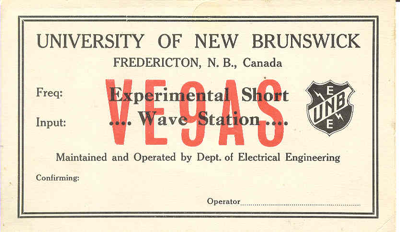
The UNB Yearbook, called Up The Hill, for the years 1948-1950 and 1952-1953, has information and photographs from the initial years of the club. Some of those images and text are reproduced here. The text from the pages is re-typed. I made and indicated corrections of known errors, spellings of names and the VE1RK call sign which is not be VEIRK. If there is some question about what was in the original text, one can compare the text on these web pages to the pictures.
1948, Up The Hill, page 134
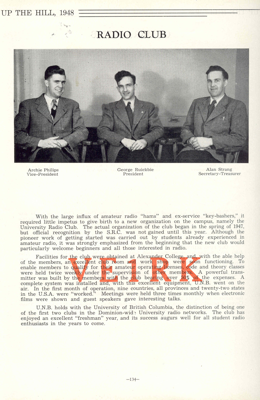
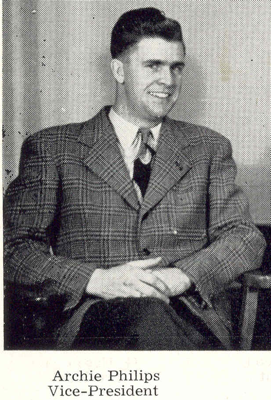
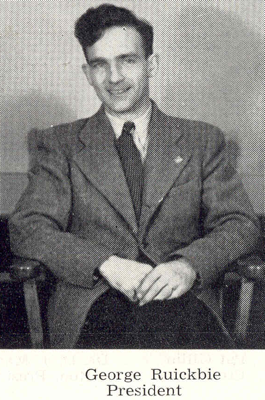
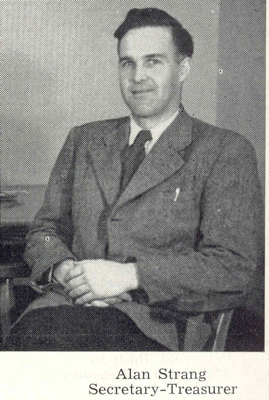
Photo note and captions: Archie Philips Vice-President, George Ruickbie President, Alan Strang Secretary-Treasurer, VE1RK
RADIO CLUB
With the large influx of amateur radio "hams" and ex-service "key-bashers," it required little impetus to give birth to a new organization on the campus, namely the University Radio Club. The actual organization of the club began in the spring of 1947, but official recognition by the S.R.C. was not granted until this year. Although the pioneer work of getting started was carried out by the students already experienced in amateur radio, it was strongly emphasized from the beginning that the new club would particularly welcome beginners and all those interested in radio.
Facilities for the club were obtained at Alexander College and with the able help of the members, an excellent club room and workshop were soon functioning. To enable members to qualify for their amateur operating licenses, code and theory classes were held twice weekly under the supervision of other members. A powerful transmitter was built by the members with the club bearing over 50$ of the expenses. A complete system was installed and, with this excellent equipment, U.N.B. went on the air. In the first month of operation, nine countries, all provinces and twenty-two states in the U.S.A. were "worked." Meetings were held three times monthly when electronic films were shown and guest speakers gave interesting talks.
U.N.B. holds with the University of British Columbia, the distinction of being one of the first two clubs in the Dominion-wide University radio networks. The club has enjoyed an excellent "freshman" year, and its success augurs well for all student radio enthusiasts in the years to come.
1948, Up The Hill, page 135
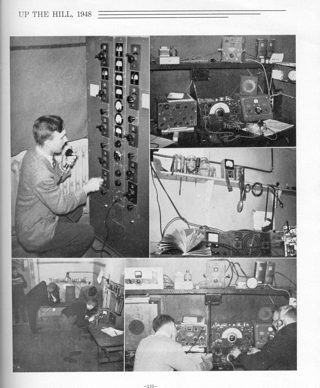
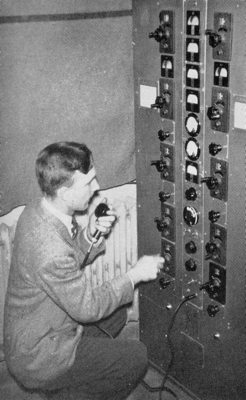
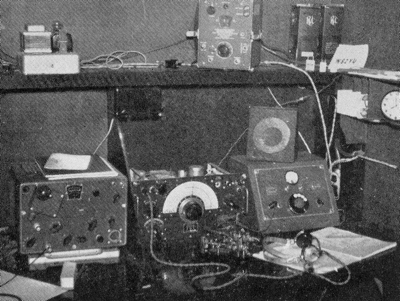
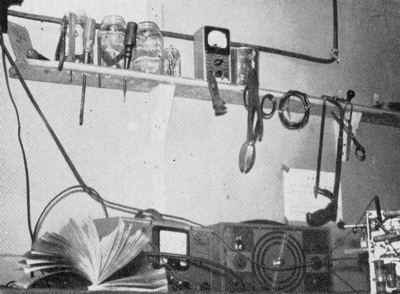
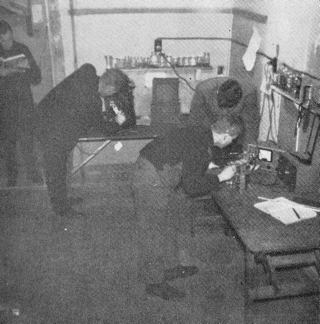
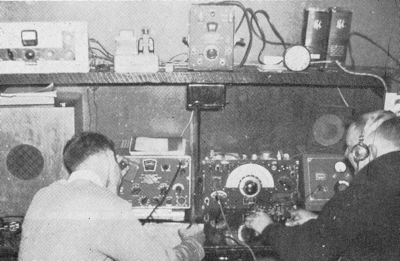
1949
Up The Hill
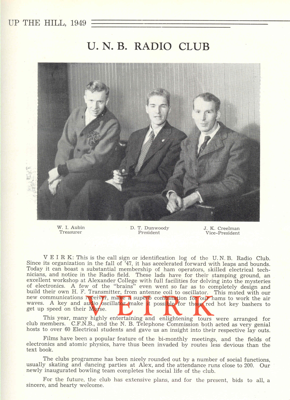
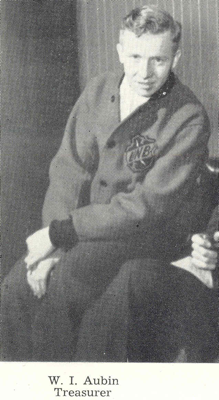
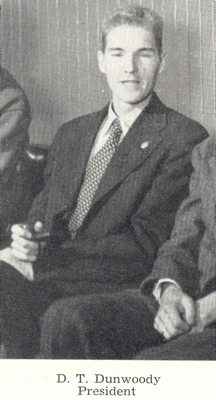
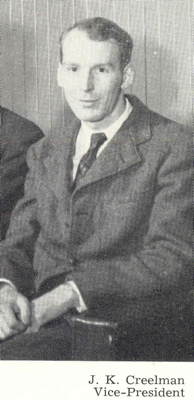
Photo note and captions: W. I. Aubin Treasurer, D. T. Dunwoody President, J. K. Creelman Vice-President, VE1RK
VE1RK: This is the call sign or identification log of the U.N.B. Radio Club. Since its organization in the fall of '47, it has accelerated forward with leaps and bounds. Today it can boast a substantial membership of ham operators, skilled electrical technicians, and notice in the Radio field. These lads have for their stamping ground, an excellent workshop at Alexander College with full facilities for delving into the mysteries of electronics. A few of the "brains" even went so far as to completely design and build their own H. F. Transmitter, from antenne coil to oscillator. This mated with our new communications receiver, make a superb combination for our hams to work the air waves. A key and audio oscillator make it possible for those red hot key bashers to get up speed on their Morse.
This year, many highly entertaining and enlightening tours were arranged for club members. C.F.N.B., and the N. B. Telephone Commission both acted as very genial hosts to over 60 Electrical students and gave us an insight into their respective lay outs.
Films have been a popular feature of the bi-monthly meetings, and the fields of electronics and atomic physics, have thus been invaded by routes less devious than the text book.
The clubs programme has been nicely rounded out by a number of social functions, usually skating and dancing parties at Alex, and the attendance runs close to 200. Our newly inaugurated bowling team completes the social life of the club.
For the future, the club has extensive plans, and for the present, bids to all, a sincere, and hearty welcome.
1950
Up The Hill
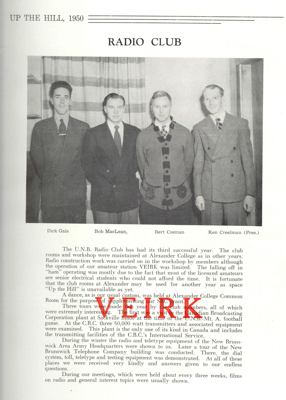
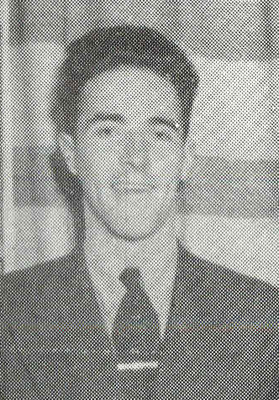
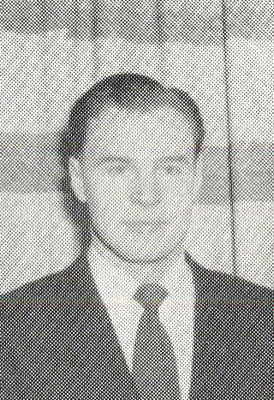
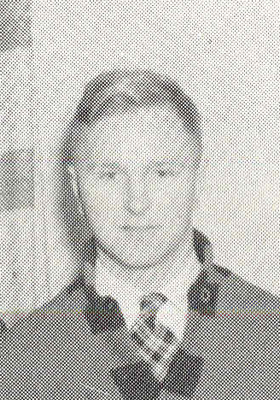
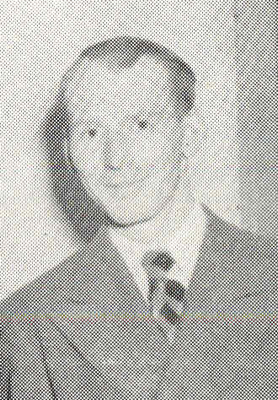
Photo note and captions: Dick Gale, Bob MacLean, Bert Cosman, Ken Creelman (Pres.), VE1RK
The U.N.B. Radio Club has had its third successful year. The club rooms and workshop were maintained at Alexander College as in other years. Radio construction work was carried on in the workshop by members although the operation of our amateur station VE1RK was limited. The falling off in "ham" operating was mostly due to the fact that most of the licenced amateurs are senior electrical students who could not afford the time. It is fortunate that the club rooms at Alexander may be used for another year as space "Up the Hill" is unavailable as yet.
A dance, as is our usual custom, was held at Alexander College Common Room for the purpose of supplementing our SRC grant.
Three tours were made this year by the club members, all of which were extremely interesting. The first was a visit to the Canadian Broadcasting Corporation plant at Sackville made at the time of the U.N.B/-Mt. A. football game. At the C.B.C. three 50,000 watt transmitters and associated equipment were examined. This plant is the only one of its kind in Canada and includes the transmitting facilities of the C.B.C.'s International Service.
During the winter the radio and teletype equipment of the New Brunswick Area Army Headquarters were shown to us. Later a tour of the New Brunswick Telephone Company building was conducted. There, the dial system, toll, teletype and testing equipment was demonstrated. At all of these places we were received very kindly and answers given to our endless questions.
During our meetings, which were held about every three weeks, films on radio and general interest topics were usually shown.
1952
Up The Hill
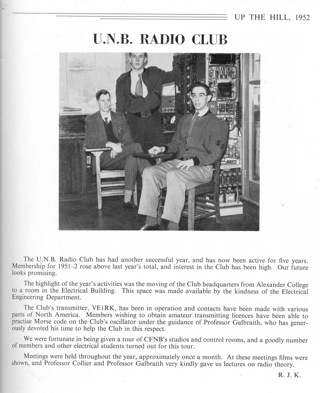
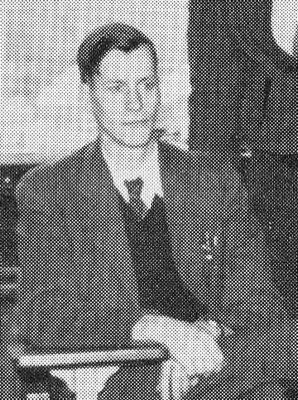
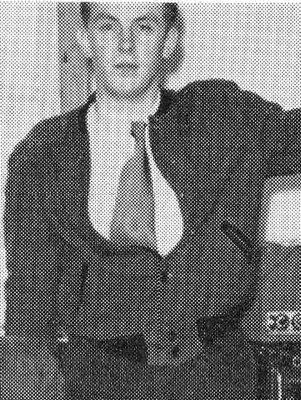
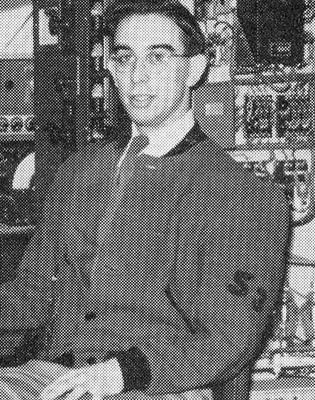
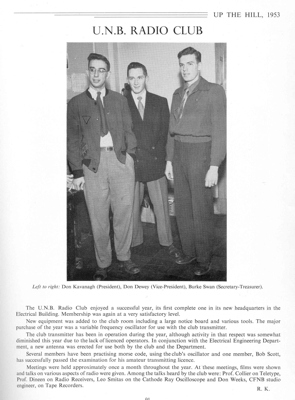
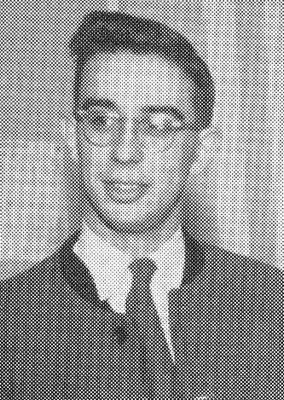
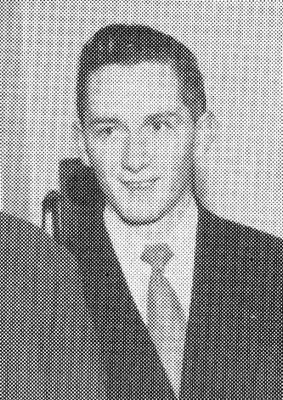
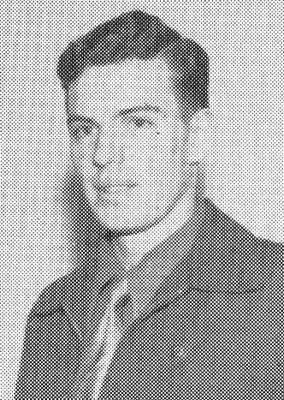
Photo note and captions: Left to right: Bob Kavanagh (President), Don Dewey (Vice-President), Burke Swan (Secretary-Treasurer), U.N.B. RADIO CLUB
The U.N.B. Radio Club enjoyed a successful year, its first complete one in its new headquarters in the Electrical Building. Membership was again at a very satisfactory level.
New equipment was added to the club room including a large notice board and various tools. The major purchase of the year was a variable frequency oscillator for use with the club transmitter.
The club transmitter has been in operation during the year, although activity in that respect was somewhat diminished this year due to the lack of licenced operators. In conjunction with the Electrical Engineering Department, a new antenna was created for use both by the club and the Department.
Several members have been practising morse code, using the club's oscillator and one member, Bob Scott, has successfully passed the examination for his amateur transmitting licence.
Meetings were held approximately once a month throughout the year. At these meetings, files were shown and talk on various aspects of radio were given. Among the talk's heard by the club were: Prof. Collier on Teletype, Prof. Dineen (web link 2) on Radio Receivers, Leo Smitas on the Cathode Ray Oscillator and Don Weeks, CFNB studio engineer, on Tape Recorders.
There is further information about the station history is on the awards and QSLs pages.
Many people and sources were used to obtained the information shown on this page. However, I especially thank Robert J. Kavanagh for providing corrections, referring me to the yearbooks, and providing me images. You are welcome to email Brent.Petersen@UNB.ca additional comments.
Up The Hill, is copyrighted by the UNB Student Union, www.unbsu.ca, and permission was granted to use the material. I sincerely thank Greg Bailey, the 2014-2015 Student Union President, for his help with the process.
1952
VE1RK Amateur Radio Club Photo
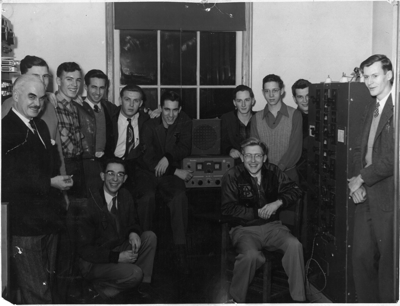
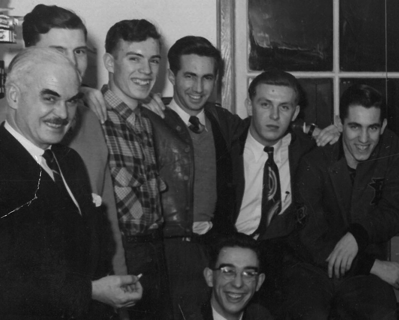
Back row: Professor Galbraith, unknown2, C. Burke Swan, unknown4, unknown5, Dick Gale
Front row: Bob Kavanagh VE1YW
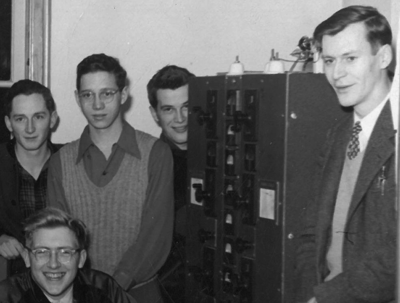
Back row: Don Dewey VE1ZK, unknown7, unknown8, unknown9
Front row: unknown10
1978
1978 image credits: John Connor, VE3TG
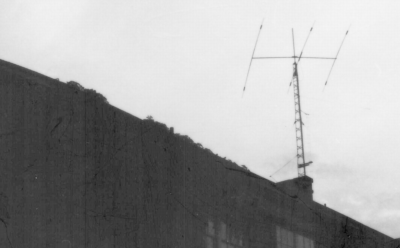
This is the TA33 antenna that provided a great deal of enjoyment and it worked all the DXCC entities.
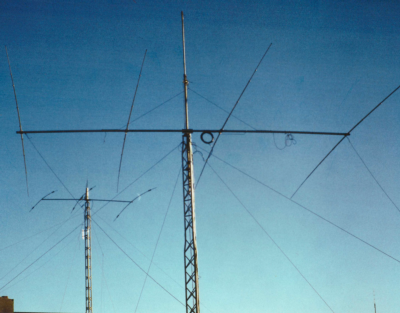
This was an upgrade to four elements on 20 m. In the image above, on the right, is a Wilson 4 element Yagi for 20 m. That picture was taken during a transition of antennas. After that image, the antennas on the towers had:
- 20 m - 4 elements,
- 15 m - 5 elements, and
- 10 m - 5 elements.
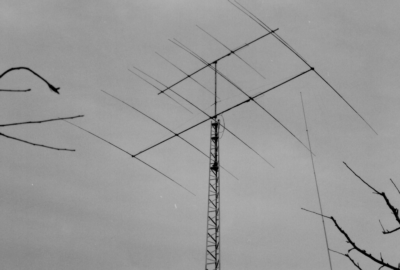
Monobanders on 15 m and 10 m were on the tower where the TA33 was. A project was started to upgrade the antennas around 1978, but like all antenna projects it went on longer than planned. Around the summer of 1980 some new antennas were put in place and they were used to good effect by club members in the 1980 CQ WW SSB to get a 2.6 M score.
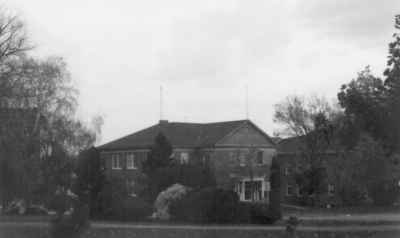
You can just barely make out the two towers gracing the roof of Head Hall. In downtown, in the right spot, you could see them.
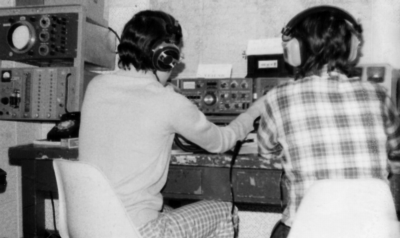
This is a typical view of a contest - the back of their heads, Craig, VE1QT, and Steve, VE1BCZ, in the contest. Note the nifty Star Trek chairs for the time. The scope in the rack could be a source of entertainment; after long exposure to the ceiling's fluorescent lights, at night the phosphor on the scope would glow a very nice ghostly horrible yellow.
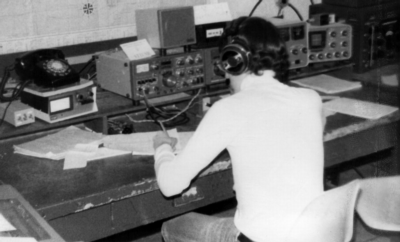
This is another view taken at 0400 during the ARRL 1978 DX Phone Contest; back then, it was two weekends long! Craig, VE1QT, is hard at work; he was the club president at the time. In the back corner you can see a Collins 51J4. Just in the bottom left corner of the picture you can see the ASR 28 Teletype.
Here's the line score from QST; that "96" is 96 hours.
VE1UNB(VE1s BCZ BEC BHA BJC QT, oprs)
1,210,482-1478-273-C-96
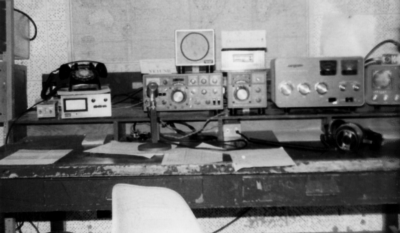
A lot of time was spent looking at that radio.
In the picture, going from left to right you can see:
1) Homebrew phone patch
2) Rotor Control box
3) Black dial rotary phone, on the rotor box, for those who have never seen such a thing!
4) TS820S
5) Separate VFO for the 820
6) Tymeter clock on top of the VFO, a Tymeter is shown at eham.net)
7) SB220, put together by John
8) Heathkit SB610 station monitor
9) SWR meter on top of the station monitor
10) Oh, and a speaker on top of the rig too.
If you would like to contribute information to the page, please email ve9unb@unb.ca.
UNB and the Department of Electrical and Computer Engineering are committed to protecting personal information. For more information on the protection of personal information at UNB please consult UNB Policy for the Protection of Personal Information and Privacy, as well as the University Secretariat, University of New Brunswick, PO Box 4400, Fredericton, NB, E3B 5A3, www.unb.ca/secretariat, phone (506) 453-4613.
This page was created on October 11, 2012 by Brent Petersen.
This page was updated on August 17, 2021 by Brent Petersen.
© Copyright 2012-2021 University of New Brunswick.


